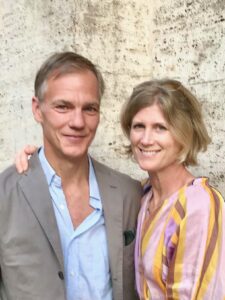
Stephen Reily and Emily Bingham are this year’s recipients of the Blanche B. Ottenheimer Award (photo provided by Stephen Reily and Emily Bingham)
By Lee Chottiner
Managing Editor
Google Stephen Reily and Emily Bingham. You will find that they both describe themselves as community builders.
But each of this year’s Blanche B. Ottenheimer Award winners have chosen very different ways to do their building.
Reily, a lawyer and entrepreneur, uses the marketplace, the arts and the law to affect change across the city.
Bingham, a Louisville native, author and historian, uses history like a mirror, accurately showing readers where they have been and how it is relevant to where they are going.
All differences aside, their work has led both leaders to interactions with, and respect for, the Jewish world over the years.
“Growing up in New Orleans, my family members were always reminding me of the disproportionate amount of investment that the Jewish community was making in terms of philanthropy and supporting all good causes,” Reily said. “In Louisville, I’ve moved to a city where the same is certainly the case.”
The Blanche B. Ottenheimer Award, which is the highest honor the Jewish Community of Louisville can give, is presented annually to a leader (or leaders) who have made a real difference – improving the quality of life in Louisville, in Kentucky and beyond.
This year, according to Bob Sachs, chairman of the Awards Committee, there was no contest.
“When someone submitted Emily and Steve’s names, the members looked at one another and all agreed,” he said. “It was the shortest Awards Committee meeting on record.”
Blanche B. Ottenheimer was a Jewish Louisville community activist. In addition to serving as president of the National Council of Jewish Women, Louisville Section, she worked for passage of the city’s Model Registration Law, which curbed corruption and led to cleaner elections.
“While we didn’t know Blanche Ottenheimer, and we wish we knew more about her, it means a lot to be honored by a community that we have such a debt to,” Reily said.
A graduate of Yale University and Stanford Law School, Reily, who once clerked for Supreme Court Justice John Paul Stevens, is managing director & CEO of IMC Licensing, a product development company; co-founder and chairman of Curated Media, which connects consumers with special-interest content, and founder and chairman of Seed Capital Kentucky, which supports sustainable farming and the local food economy.
He directed the Speed Art Museum from 2017 to 2021.
And he ran for Louisville Metro Council from District 8 in 2016, finishing second in a field of seven by 116 votes.
As a lawyer and philanthropist, he has championed the plight of some 300,000 Kentuckians, disproportionately Black, who cannot get their criminal records expunged even though they have served their time and stayed out of trouble. The Reily Reentry Project, a program he funds at the Louisville Urban League, has been responsible for a majority of all criminal expungements in Kentucky since it was created in 2018.
He also serves on the board of LHome, a community development financial institution with roots in Jewish Louisville that provides business and home loans in low-income areas.
“Capital is not distributed as evenly as talent and ideas,” Reily said. “As an entrepreneur, I know I had access to capital – my own and others – that a young Black 30-year-old in my position never would have had access to. So, LHome’s job as the only homegrown CDFI is to get capital into the hands of people who banks aren’t naturally lending money to.”
A graduate of Harvard University with a Ph.D. in history from the University of North Carolina at Chapel Hill, Bingham sees the attraction of history as reminding people living today just how relevant their lives are.
She is the author of My Old Kentucky Home: the Astonishing Life and Reckoning of an Iconic American Song, Irrepressible: The Jazz Age Life of Henrietta Bingham, The Southern Agrarians and the New Deal, and she is currently working on another book.
But it was through her first book, Mordecai: An Early American Family, that Bingham’s career intersected with the history of American Jews.
Mordecai is a story of a Jewish family living in North Carolina in the early 19th century and how they wrestled with their American and Jewish in South. The research for the book was the basis for her dissertation at UNC.
But it also opened doors to the Jewish world for Bingham. She did research at Hebrew Union College-Jewish Institute of Religion in Cincinnati, living in the dorms and meeting with preeminent American Jewish scholar Rabbi Jacob Rader Marcus.
“That was an amazing and intellectual writing experience for me,” Bingham said. “I adored learning about this 19th century family, I was very, very taken with their incredible talent and ambition and their aspirations as Americans, and their determination to be American citizens and what that meant to them.”
“Whenever I do a project, the best part is being taken down a road that’s not familiar,” she continued, “and for me that unfamiliar road in this case was Jewish history and specifically Jewish American history and even more specifically Jewish history in the American South.”
Her latest book, My Old Kentucky Home, the story of the classic but tragic song about a slave sold away from his native Kentucky, still stirs raw feelings today in an America where equality can still be elusive.
Bingham isn’t afraid to address difficult issues in her books.
“To me, the only reason I really want to write history is to help people who are living today understand that they too are in the course of history,” she said, “that they are shaped by what happened before, even if they don’t know it, and that they are part of shaping what’s coming after.”


